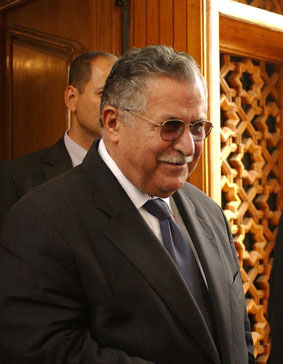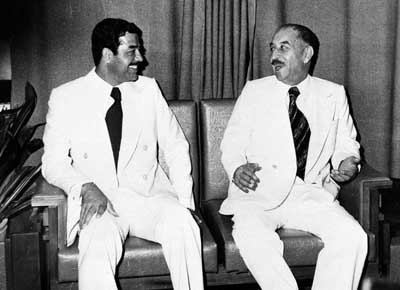|
Halabja Massacre
The Halabja massacre ( ) took place in Iraqi Kurdistan on 16 March 1988, when thousands of Kurds were killed by a large-scale Iraqi chemical weapons program, Iraqi chemical attack. A targeted attack in Halabja, it was carried out during the Anfal campaign, which was led by Iraqi military officer Ali Hassan al-Majid. Two days before the attack, the city had been captured by Iran as part of Operation Zafar 7 of the Iran–Iraq War. Following the incident, the United Nations launched an investigation and concluded that mustard gas as well as unidentified nerve agents had been used against Kurdish civilians. The Defense Intelligence Agency, United States Defense Intelligence Agency initially blamed Iran for the attack, though the majority of evidence later revealed that Ba'athist Iraq, Iraq had used the chemical weapons to bolster an ongoing military offensive against Iran, pro-Iranian Kurdish fighters, and ordinary Halabja residents. To date, the Halabja massacre remains the largest ... [...More Info...] [...Related Items...] OR: [Wikipedia] [Google] [Baidu] |
Halabja
Halabja (, ) is a city in the Kurdistan Region of Iraq and the capital of Halabja Governorate, located about northeast of Baghdad and from the Iranian border. The city lies at the base of what is often referred to as the greater Hewraman region stretching across the Iran–Iraq border. Halabja is surrounded by Hawraman and Shnrwe range in the northeast, Balambo range in the south and Sirwan river in the west. The Kurds in the city of Halabja generally speak only the Sorani dialect of Kurdish, but some residents of the surrounding villages speak the Gorani dialect. History Early history The history of Halabja is believed to have started during the Akkadian Empire period (24th century BC). The ancient city-kingdom of Lullubi from that period is thought to be located in Halabja area. The excavations at nearby archaeological sites like Bakr Awa revealed a long history. The cemetery there includes the tombs of several historical figures, such as Ahmed Mukhtar Jaff, Tayar Bag ... [...More Info...] [...Related Items...] OR: [Wikipedia] [Google] [Baidu] |
Cambridge University Press
Cambridge University Press was the university press of the University of Cambridge. Granted a letters patent by King Henry VIII in 1534, it was the oldest university press in the world. Cambridge University Press merged with Cambridge Assessment to form Cambridge University Press and Assessment under Queen Elizabeth II's approval in August 2021. With a global sales presence, publishing hubs, and offices in more than 40 countries, it published over 50,000 titles by authors from over 100 countries. Its publications include more than 420 academic journals, monographs, reference works, school and university textbooks, and English language teaching and learning publications. It also published Bibles, runs a bookshop in Cambridge, sells through Amazon, and has a conference venues business in Cambridge at the Pitt Building and the Sir Geoffrey Cass Sports and Social Centre. It also served as the King's Printer. Cambridge University Press, as part of the University of Cambridge, was a ... [...More Info...] [...Related Items...] OR: [Wikipedia] [Google] [Baidu] |
Peshmerga
The Peshmerga () are the internal security forces of Kurdistan Region. According to the Constitution of Iraq, regional governments are responsible for "the establishment and organization of the internal security forces for the region such as police, security forces, and guards of the region". Other Kurdish security agencies include the Zêrevanî (gendarmerie), Asayish ( security and counterterrorism service), and the '' Parastin û Zanyarî'' (intelligence agency). The Peshmerga's history dates back to the 18th century, when they began as a tribal paramilitary border guard under the Ottoman Turks and the Safavid Kurds. By the 19th century, they had evolved into a disciplined and well-trained guerrilla force. Formally, the Peshmerga are under the command of the Ministry of Peshmerga Affairs of the Kurdistan Regional Government. In practice, however, the Peshmerga's structure is largely divided and controlled separately by the two Iraqi Kurdish political parties: the Democr ... [...More Info...] [...Related Items...] OR: [Wikipedia] [Google] [Baidu] |
Ba'ath
Ba'athism, also spelled Baathism, is an Arab nationalist ideology which advocates the establishment of a unified Arab state through the rule of a Ba'athist vanguard party operating under a revolutionary socialist framework. The ideology is officially based on the theories of the Syrian intellectuals Michel Aflaq (per the Iraqi-led Ba'ath Party), Zaki al-Arsuzi (per the Syrian-led Ba'ath Party), and Salah al-Din al-Bitar. Ba'athist leaders of the modern era include the former president of Iraq Saddam Hussein, and former presidents of Syria Hafez al-Assad and his son Bashar al-Assad. The Ba'athist ideology advocates the " enlightenment of the Arabs" as well as the renaissance of their culture, values and society. It also advocates the creation of one-party states and rejects political pluralism in an unspecified length of time—the Ba'ath party theoretically uses an unspecified amount of time to develop an "enlightened" Arab society. Ba'athism is founded on the principl ... [...More Info...] [...Related Items...] OR: [Wikipedia] [Google] [Baidu] |
Patriotic Union Of Kurdistan
The Patriotic Union of Kurdistan (PUK; ) is a political party active in Kurdistan Region and the Disputed territories of Northern Iraq, disputed territories in Iraq. The PUK describes its goals as self-determination, human rights, democracy and peace for the Kurds, Kurdish people of Kurdistan and Iraq. The PUK is currently under the leadership of Bafel Talabani. The PUK was founded in 1975 by Adel Murad, Jalal Talabani, Nawshirwan Mustafa, Fuad Masum, Ali Askari and Abdul Razaq Feyli Dawood Mohammed Ali. All presidents of Iraq under the 2005 constitution have been from this party. History Discontent within the Kurdistan Democratic Party (KDP) The PUK traces its political heritage to Sulaymaniyah native Ibrahim Ahmad. After the collapse of the Soviet-backed Kurdish Mahabad Republic in Iran in early 1947, Ibrahim Ahmad, previously the Sulaymaniyah representative of the Iranian KDP (KDP-I), joined the newly formed Iraqi Kurdistan Democratic Party, KDP. Ahmad was a highly influent ... [...More Info...] [...Related Items...] OR: [Wikipedia] [Google] [Baidu] |
Kurdistan Democratic Party
The Kurdistan Democratic Party (), usually abbreviated as KDP or PDK, is the ruling Political party, party in Iraqi Kurdistan and the senior partner in the Kurdistan Regional Government. It was founded in 1946 in Mahabad in Iranian Kurdistan. The party states that it combines "democratic values and social justice to form a system whereby everyone in Kurdistan can live on an equal basis with great emphasis given to rights of individuals and freedom of expression." The KDP is dominated by the Barzani Kurds, Barzani tribe and the party's stated ideologies are Rule of law, lawfulness, secularism, and Kurdish nationalism. It wants to build a "Social market economy, social-oriented" economy, and lists civil solidarity and social justice as the basis of its ideology. History Foundation In 1946, the leader of the Soviet-backed Republic of Mahabad, Qazi Muhammad, announced the formation of a "Kurdish Democratic Party" based in Iran, or Eastern Kurdistan. The Soviet Union, then sup ... [...More Info...] [...Related Items...] OR: [Wikipedia] [Google] [Baidu] |
Crimes Against Humanity
Crimes against humanity are certain serious crimes committed as part of a large-scale attack against civilians. Unlike war crimes, crimes against humanity can be committed during both peace and war and against a state's own nationals as well as foreign nationals.Margaret M. DeGuzma"Crimes Against Humanity"''Research Handbook on International Criminal Law'', Bartram S. Brown, ed., Edgar Elgar Publishing, 2011. Together with war crimes, genocide, and the crime of aggression, crimes against humanity are one of the core crimes of international criminal law and, like other crimes against international law, have no temporal or jurisdictional limitations on prosecution (where universal jurisdiction is recognized). The first prosecution for crimes against humanity took place during the Nuremberg trials against defeated leaders of Nazi Germany. Crimes against humanity have been prosecuted by other international courts (such as the International Criminal Tribunal for the former Yugosl ... [...More Info...] [...Related Items...] OR: [Wikipedia] [Google] [Baidu] |
Parliament Of Canada
The Parliament of Canada () is the Canadian federalism, federal legislature of Canada. The Monarchy of Canada, Crown, along with two chambers: the Senate of Canada, Senate and the House of Commons of Canada, House of Commons, form the Bicameralism, bicameral legislature. The 343 members of the lower house, the House of Commons, are styled as Member of Parliament (Canada), ''Members of Parliament'' (MPs), and each elected to represent an Electoral district (Canada), electoral district (also known as a riding). The 105 members of the upper house, the Senate, are styled ''senators'' and appointed by the Governor General of Canada, governor general on the advice of the Prime Minister of Canada, prime minister. Collectively, MPs and senators are known as ''parliamentarians''. Bills may originate in either the House of Commons or the Senate, however, bills involving raising or spending funds must originate in the House of Commons. By Constitutional convention (political custom), cons ... [...More Info...] [...Related Items...] OR: [Wikipedia] [Google] [Baidu] |
Saddam Hussein
Saddam Hussein (28 April 1937 – 30 December 2006) was an Iraqi politician and revolutionary who served as the fifth president of Iraq from 1979 until Saddam Hussein statue destruction, his overthrow in 2003 during the 2003 invasion of Iraq, U.S. invasion of Iraq. He previously served as the Vice President of Iraq, vice president from 1968 to 1979 and also as the prime minister of Iraq, prime minister from 1979 to 1991 and later from 1994 to 2003. A leading member of the Ba'ath Party, Arab Socialist Ba'ath Party, he espoused Ba'athism, a mix of Arab nationalism and Arab socialism, while the policies and political ideas he championed are collectively known as Saddamism. Born near the city of Tikrit to a Sunni Islam, Sunni Arabs, Arab family, Saddam joined the revolutionary Ba'ath Party in 1957. He played a key role in the 17 July Revolution that brought the Ba'athists to power and made him Vice President of Iraq, vice president under Ahmed Hassan al-Bakr. During his tenure ... [...More Info...] [...Related Items...] OR: [Wikipedia] [Google] [Baidu] |
Genocidal Massacre
The term ''genocidal massacre'' was introduced by Leo Kuper (1908–1994) to describe incidents which have a genocidal component but are committed on a smaller scale when they are compared to genocides such as the Rwandan genocide. Others such as Robert Melson, who also makes a similar differentiation, class genocidal massacres as "partial genocide". In his book '' Blood and Soil'', Ben Kiernan states that imperial powers have often committed genocidal massacres to control difficult minorities within their empires. As an example he describes the actions of two Roman legions which were sent to Egypt in 68 AD in order to quell Jews who were rioting in Alexandria in support of Jews who were taking part in the First Jewish–Roman War. The Roman governor Tiberius Julius Alexander ordered two legions to massacre the inhabitants of the Jewish quarter, which was carried out to the letter, sparing none whatever their age or sex. The massacre ended after about 50,000 had been killed wh ... [...More Info...] [...Related Items...] OR: [Wikipedia] [Google] [Baidu] |
Supreme Iraqi Criminal Tribunal
The Iraqi High Tribunal (IHT), formerly the Iraqi Special Tribunal and sometimes referred to as the Supreme Iraqi Criminal Tribunal, is a body established under Iraqi national law to try Iraqi nationals or residents accused of genocide, crimes against humanity, war crimes or other serious crimes committed between 1968 and 2003. It organized the trial of Saddam Hussein and other members of his Ba'ath Party regime. The court was set up by a specific statute issued under the Coalition Provisional Authority and was reaffirmed under the jurisdiction of the Iraqi Interim Government. In 2005 it was renamed after the constitution established that "Special or exceptional courts may not be established." The Transitional Administrative Law (TAL) promulgated by the Iraq Governing Council before the restoration of Iraqi sovereignty preserved and continued the Iraq Special Tribunal Statute in force and effect. The court was responsible for the trial of Saddam Hussein, Ali Hassan al-Majid (a ... [...More Info...] [...Related Items...] OR: [Wikipedia] [Google] [Baidu] |






